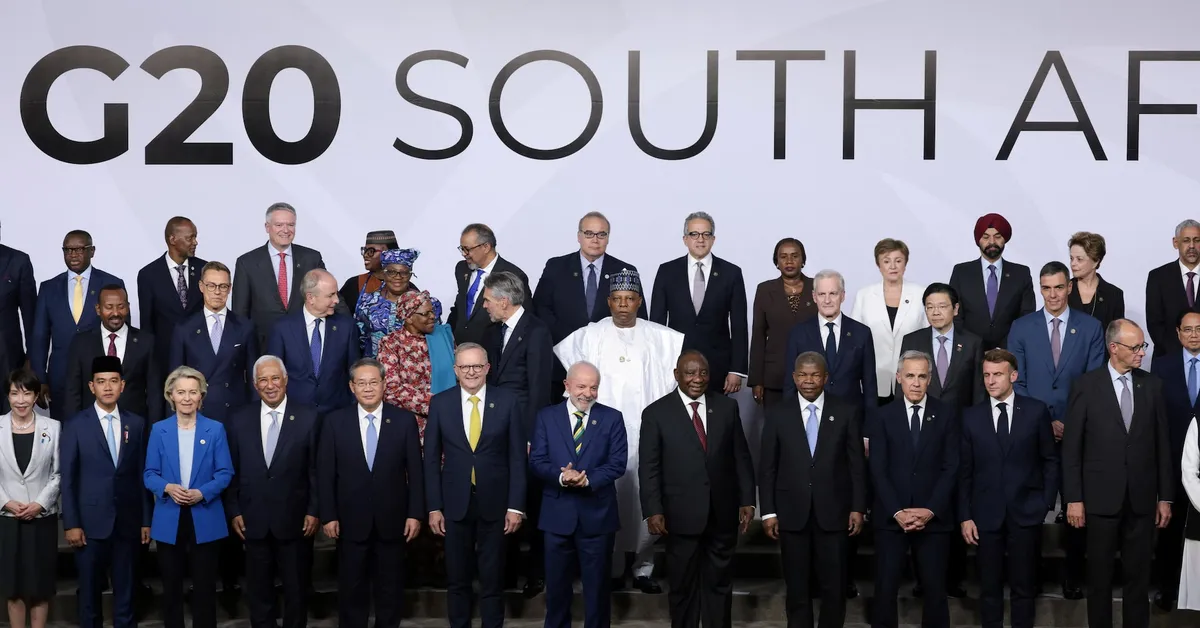
In a significant turn of events, the Group of 20 (G20) major economies achieved a rare victory for multilateralism this past weekend. The summit, held under the presidency of South Africa, managed to rally nearly all member nations, with the notable exceptions of the United States and Argentina, to issue a comprehensive declaration. This move came despite the ongoing boycott and objections from the U.S., highlighting the resilience of the G20 even in the face of adversity.
Many observers were skeptical about South Africa's ability to secure a declaration, particularly on pressing issues such as assisting poorer nations in coping with climate change and managing external debt. However, the success of the summit not only strengthened the G20's position but also underscored the importance of multilateral cooperation at a time when global collaboration seemed to be waning, according to researchers and delegates.
The outcomes of the summit provoked frustration within the United States, which is set to host next year's G20. The White House accused South Africa of "weaponizing" its presidency, claiming it undermined the foundational principles of the G20 that prioritize unanimous consensus. Despite this criticism, South African President Cyril Ramaphosa rejected an offer from the U.S. to transfer the G20 presidency to a junior diplomat, indicating a steadfast approach to maintaining leadership in the discussions.
The final paragraph of the G20 declaration was intricately worded, committing member nations to future meetings in Britain and South Korea, but primarily under the U.S. presidency. This careful framing is indicative of the ongoing diplomatic balancing act within the G20, as nations seek to collaborate despite political tensions.
The summit was overshadowed by President Trump’s boycott, driven by unfounded claims regarding South Africa's treatment of its white minority. A South African delegate expressed relief at the agreement reached on a draft declaration, signaling a significant achievement amid the backdrop of discord. According to Josh Lipsky, a former aide to President Obama and now with the Atlantic Council, the narrative surrounding the G20's potential demise is greatly exaggerated, asserting that the group will continue to be relevant in times of crisis.
One of the key topics addressed during the summit was the establishment of the first global panel dedicated to tackling inequality. Nabil Ahmed, Senior Director of Economic Injustice at Oxfam, emphasized the importance of placing inequality at the forefront of the international agenda during this meeting of world leaders. This focus represents a significant shift in the discussions traditionally held within the G20 framework.
Faced with Trump's reaction, G20 leaders had to decide whether to appease the U.S. or take a stand. Ultimately, they chose the latter, reflecting growing frustration with the current U.S. administration's approach. The unity displayed at the summit aimed to support South Africa as host and to critique the U.S. for its disengagement from the G20's first African summit.
Looking ahead, there is a risk that much of the work accomplished in Johannesburg could be undone under U.S. leadership. The White House plans to narrow the G20's focus during its presidency, which coincides with the 250th anniversary of the United States, potentially sidelining key working groups on crucial issues such as energy, health, and the environment.
Despite the tensions, there are overlapping agendas between the U.S. and South Africa on critical topics like development, economic growth, and financial stability. Eric LeCompte, a U.N. adviser, noted that there is likely to be continuity in certain areas, suggesting that collaboration may still be possible even with differing leadership styles.
In conclusion, the recent G20 summit exemplified the potential for international cooperation amidst discord, presenting an opportunity for member nations to unite on pressing global challenges. As the G20 prepares for the U.S. presidency, the focus will remain on maintaining momentum in addressing inequality and fostering sustainable development.